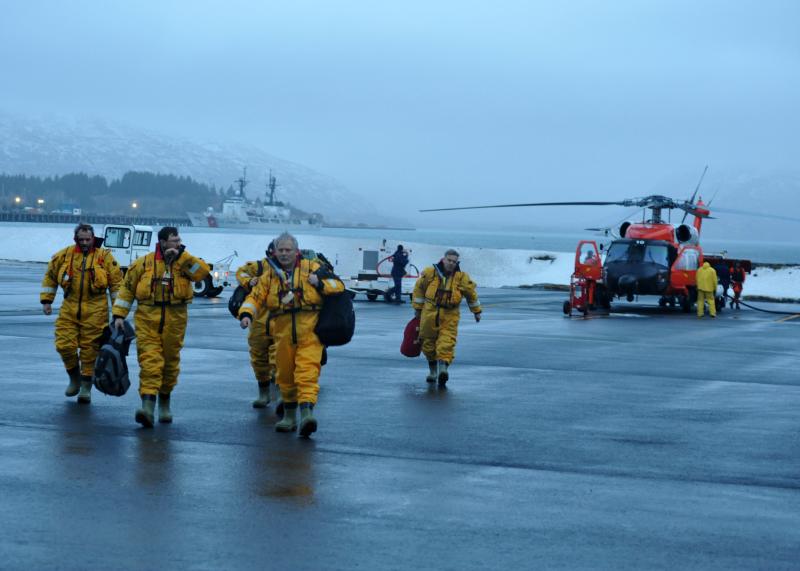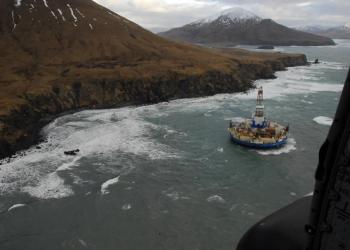Boothbay man recounts oil rig grounding

Cyrus Lauriat is no stranger to the perils of the Gulf of Alaska.
Besides the floating ice fortresses that roam freely in the Gulf and the Bering Sea, there are sub-hurricane-level storms that happen regardless of season.
It was just such a storm Lauriat, an engineer with Shell Oil, faced New Year's Eve when he and the rest of the crew of the Kulluk had to be evacuated from the mobile oil drilling rig by the United States Coast Guard.
Lauriat, a Boothbay native, said the experience was harrowing but that in that part of the world danger can come at any time.
“I've been at this for 43 years,” he said. “There are still ways it surprises you. It's a part of the job, and you really only think about once it happens.”
Lauriat was on the Kulluk, a 266-foot diameter drilling rig, when it ran into a sub-hurricane-level storm and before it ran aground on Sitkalidak Island.
On December 28 Kulluk's line to the tugboat Aiviq was snapped as it was being hauled to Seattle, Wash. For the winter and the rig began experiencing technical problems as a violent Alaskan storm raged. By the afternoon of December 29 the crew was being airlifted from the rig and on December 31 the rig was grounded. It sat on the rocks of Sitkalidak Bay until January 6 when a Dutch rig was flown in and helped dislodge the rig from the shore.
Before it ran aground there were three separate attempts to tow the rig to safety. Each time, the rope snapped. Kulluk was being towed from the Gulf of Alaska to Seattle, Wash.
The Kulluk has no self-propulsion; instead the 150-foot tall rig relies on tugs and tows to move around.
During a 24-hour period 85 of the Kulluk's 96 fuel injectors were replaced. Lauriat said it wasn't until he was back on land that he had a solid night's sleep.
Lauriat said procedures are under way to see what exactly had happened with the fuel injectors.
The Kulluk contained approximately 143,000 gallons of diesel fuel and more than 12,000 gallons of lube oil and hydraulic fluid. Because of its volatile lode the vessel's beaching has drawn close scrutiny. Nothing leaked from the Kulluk's hull and there were no reported injuries, but the Coast Guard and Shell are both still investigating the incident.
The Kulluk's season got off to a rocky start before it was grounded.
“Despite what they say, there was plenty of ice and that meant we had a later start than usual,” Lauriat said. “We are usually there by late June, but this year it didn't clear out and we didn't get there until August.”
In August the Kulluk ran into severe weather but it was nothing to the storm the rig faced before New Year.
Following the storm, Lauriat didn't hesitate to sing the praises of the Coast Guard's 17th District, which came to the Kulluk's rescue.
“They did a heck of a job,” he said. “They got the crew off (the Kulluk) quickly.”
The Kulluk was without three of its four main engines which would be trying in normal circumstances, but when the three engines lost power the Kulluk happened to be bobbing in seas of more than 30 feet.
Being over prepared for what the Gulf can throw at a vessel is the best strategy, Lauriat said, adding that it was a lesson he learned after six years fishing in the icy northern waters.
“If a four inch rope would work, you're better off boosting that up to an eight-inch rope,” he said. “From there, you're better off making it a 12-inch rope just because of the weather.”
Despite the incident, Lauriat said he would likely return.
Ben Bulkeley can be reached at 207-633-4620 or bbulkeley@boothbayregister.com. Follow him on Twitter: @BBRegisterBen.




























